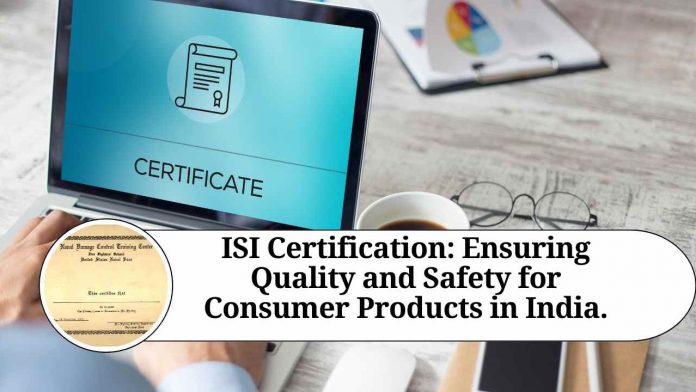In India, ISI Certification is a mark of quality assurance and safety for various consumer products. The ISI mark is a certification mark that signifies conformity to the Indian Standard Institute (ISI) standards for a product. This certification is mandatory for certain products that are sold in the Indian market.
ISI Certification is an initiative of the Bureau of Indian Standards (BIS), which is a national body responsible for setting standards for various products and services in India. The BIS was established in 1987 by the Indian government, and it is responsible for the formulation and implementation of national standards.
The ISI mark is a symbol of quality and safety, and it assures the consumers that the product they are buying is of good quality and meets the safety standards set by the BIS. The ISI certification is mandatory for products such as electrical appliances, cement, LPG cylinders, automotive components, and other products that have a direct impact on the safety of consumers.
The process of obtaining ISI certification is a rigorous one, and it involves various stages. The manufacturer has to apply to the BIS for certification, and they have to submit samples of their products for testing. The samples are tested in the BIS-approved laboratories, and if the product meets the required standards, the manufacturer is granted the ISI certification.
The ISI certification is valid for a period of two years, and the manufacturer has to undergo regular audits and testing to ensure that their products continue to meet the required standards.
The benefits of ISI Certification are many. For consumers, it assures them of the quality and safety of the products they are buying. For manufacturers, it helps them to build a reputation for quality and safety, and it gives them a competitive advantage in the market.
In conclusion
ISI Certification is an important mark of quality and safety for various consumer products in India. It assures the consumers of the quality and safety of the products they are buying, and it helps manufacturers to build a reputation for quality and safety. The certification process is rigorous, and it involves various stages, including testing and auditing, to ensure that the products continue to meet the required standards.
Other Related Blogs: Section 144B Income Tax Act
Frequently Asked Questions (FAQs)
Q: What is ISI Certification?
A: ISI Certification is a certification mark that signifies conformity to the Indian Standard Institute (ISI) standards for a product. It is a mark of quality assurance and safety for various consumer products sold in the Indian market.
Q: Which products require ISI Certification?
A: The products that require ISI Certification include electrical appliances, cement, LPG cylinders, automotive components, and other products that have a direct impact on the safety of consumers.
Q: Who grants ISI Certification?
A: The Bureau of Indian Standards (BIS), a national body responsible for setting standards for various products and services in India, grants ISI Certification.
Q: What is the process of obtaining ISI Certification?
A: The manufacturer has to apply to the BIS for certification, and they have to submit samples of their products for testing. The samples are tested in the BIS-approved laboratories, and if the product meets the required standards, the manufacturer is granted the ISI certification.
Q: How long is the ISI Certification valid?
A: The ISI certification is valid for a period of two years, and the manufacturer has to undergo regular audits and testing to ensure that their products continue to meet the required standards.
Q: What are the benefits of ISI Certification?
A: The benefits of ISI Certification are many. For consumers, it assures them of the quality and safety of the products they are buying. For manufacturers, it helps them to build a reputation for quality and safety, and it gives them a competitive advantage in the market.
Q: Is ISI Certification mandatory for all products sold in India?
A: No, ISI Certification is mandatory only for certain products that have a direct impact on the safety of consumers. Other products may require different certifications or may not require any certification at all.
Q: Can a manufacturer sell their products without ISI Certification?
A: No, manufacturers cannot sell their products without ISI Certification if it is mandatory for their product category. If they do so, they may face legal penalties and their products may be seized by the authorities.
Q: Can a manufacturer apply for ISI Certification online?
A: Yes, the manufacturer can apply for ISI Certification online through the BIS website. They can also apply through the BIS-approved testing laboratories.




















